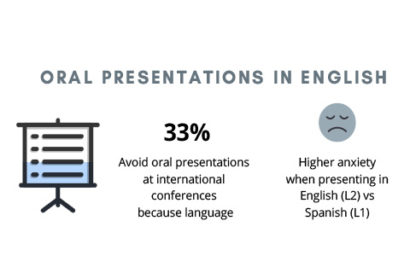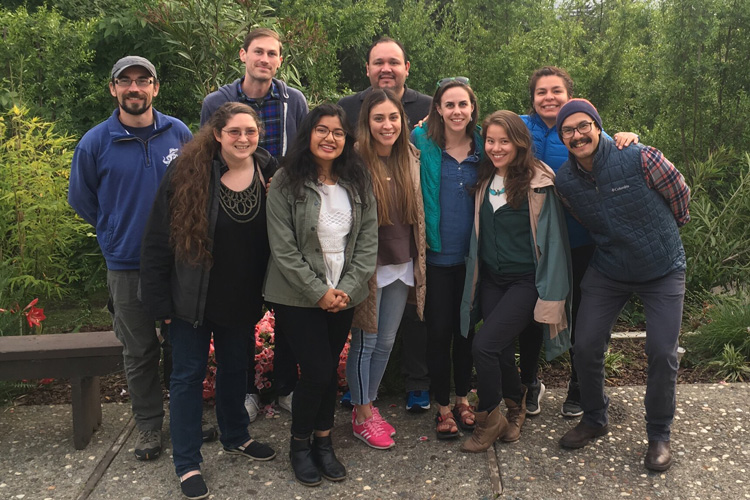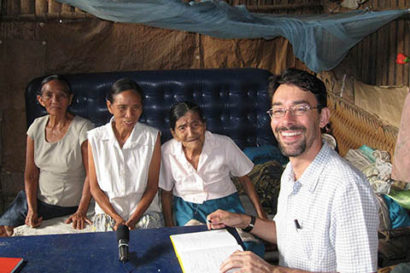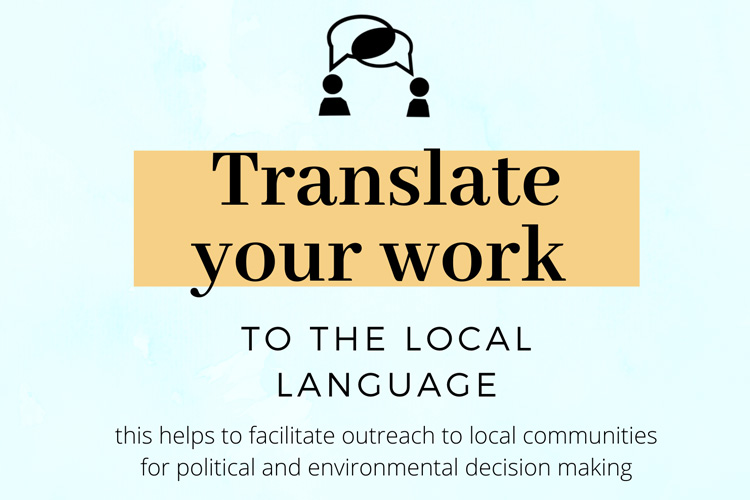Is English the lingua franca of science? Not for everyone.
A graduate student surveyed scientists in her native Colombia and found that English hinders participation by Spanish speakers
October 14, 2020

Valeria Ramírez-Castañeda, a UC Berkeley graduate student from Colombia. While English facilitates discussion of science across borders, she argues, its dominance excludes from the field many people from non-English speaking countries — in particular, the global south. She is shown here on Bahía Málaga in Colombia’s Valle del Cauca. (Photo courtesy of Valeria Ramírez-Castañeda)
English has become the de facto language of science: International conferences are held in English, the world’s top scientific journals are in English and academics in non-English speaking countries get promoted based on their publications in English language journals. Even scientific jargon is in English — most non-English speakers use English terms and don’t bother inventing equivalent words in their native languages.
Yet, for much of the world — in particular, the global south, where English is not a common second language — English limits entry into the the world of science and limits public access to scientific results, even when they pertain to a person’s own country.
Valeria Ramírez-Castañeda, a graduate student in the Department of Integrative Biology at the University of California, Berkeley, encountered this firsthand when she began writing her master’s thesis at the University of Los Andes in Bogota, Colombia, her native country. While she was one of the lucky ones — growing up in Bogota, her mother had the foresight to insist she take Saturday English classes — she found it impossible to write in English. To her, Spanish felt natural, not English.
“When I was writing the thesis, a lot of people told me, ‘Just write it in English.’ And I couldn’t. It was too difficult to write it in English,” she said. “I was like, ‘No, I have already enough pressure to finish this on time, and it is already difficult to write science — so, I am going to write it in Spanish.’”
But she also wanted to submit it to a scientific journal, which requires that she translate her thesis — about how snakes adapt to eating poisonous frogs — into English.
“Since then, I haven’t published that paper. I am still working on that,” she admitted. “I felt that English was kind of a handicap for me just to advance, to progress in research.”
Her introduction to the “language hegemony in scientific publishing,” as she calls it, led her to ask other Colombian doctoral students about the impact this has had on their careers. The results of her survey, published last month in the journal PLOS ONE, document the negative consequences of English dominance in science.
She found that more than 90% of articles published by Colombian researchers are in English, and that this has created financial burdens. More than 40% of those she surveyed reported that one of their papers had been rejected because of English grammar, forcing them to pay for a native English speaker to review the manuscript or ask a favor of an English-speaking friend. Translation and editing services charge between one-quarter and one-half of a typical doctoral student’s monthly salary in Colombia, she found.

Among of the study’s findings were that the Colombian scientists surveyed had higher anxiety when presenting their research in English, and that one-third avoided giving oral presentations at meetings because of language issues. Click on the image to see a summary of other survey results. (UC Berkeley image courtesy of Valeria Ramírez-Castañeda)
Fully one-third of the 49 respondents, recruited through Twitter with the hashtag #CienciaCriolla, used between Colombian researchers, reported that they had elected to not attend a scientific conference or meeting because of the requirement that oral presentations be in English.
“When I published this on bioRxiv and tweeted, a lot of people started writing to me with very emotional things like, ‘I left science because of English,’ ‘I cannot graduate with a master’s thesis because of English,’ ‘I thought about studying abroad, but then I had the interview and I froze because of English,’ (and) ‘I couldn’t do it.’ Super difficult things,” said Ramírez-Castañeda. “People are leaving science because of English. It is not something that is isolated.”
She found, too, that colleagues with high English proficiency were more likely to have backgrounds higher on the socioeconomic ladder. In Colombia, as in the U.S., socioeconomic status is correlated with race.
“Now that we (in the U.S.) are speaking about the Black community, in many places, including Colombia, race means socioeconomic differences, poverty,” she said. “We don’t see a lot of Black scientists from Colombia, not only because being from a political minority and being a scientist is difficult, but also because of English. At the end, it is another layer to the difficulty, and we are not talking about it. That is the thing that worries me the most, that it is something that is super-quiet and silent, as if if didn’t exist.”
Even for U.S. citizens, English can be a barrier
Poor English skills are even an issue for those raised in the U.S., said José Pablo Vázquez-Medina, an assistant professor of integrative biology who came to UC Berkeley three years ago.

José Pablo Vázquez-Medina with his lab colleagues. He studies the physiology of sea mammals, in particular how they are able to dive for long periods of time without suffering oxygen deprivation. He says that some U.S.-born Latinx students have problems writing English, which hinders their participation in science. (UC Berkeley photo courtesy of José Pablo Vázquez-Medina)
“I have friends who are Latinos, but born and raised in the U.S. They send in a paper, and they are asked to run it by a native speaker,” he said. “With students who have come from disadvantaged backgrounds, you can see that in how they write. I see it as another hurdle.”
He ascribes this to poor schools that fail to teach English to students from non-English speaking families.
“That comes back to segregation. Where you live is where you go to school, and if you live in a rich neighborhood, you go to a school with resources; if you live in a poor neighborhood, you go to a school with less resources,” he said. “Without fixing that problem, I don’t see us making a lot of impact.”
Growing up in San Luis Potosi in Mexico, Vázquez-Medina had access to some English education. His parents were teachers. But he still has flashbacks about the writing suggestions of mentors and friends, most of them offered graciously, he said.
“I remember my very first paper. I wrote it in Spanish, and I translated it (into English). It was horrible,” said Vázquez-Medina, who obtained his undergraduate degree from the Autonomous University of Baja California Sur in La Paz. Luckily, a coauthor on the paper made helpful comments. “It is definitely a barrier when you want to move up and go to grad school. Even if you go to grad school in Mexico, you have to publish papers in English.”
Vázquez-Medina benefitted from working with a mentor who had studied in Canada and the U.S. and provided English tips. This mentor also sparked his interest in the physiology of marine mammals, which led him to a Ph.D. program at UC Merced, where he studied the diving and fasting physiology of elephant seals and was supported by the UC MEXUS program.
“I always thought, ‘Why don’t more people apply to this program? This is a great opportunity,’” he said. “But I felt that English was probably one of the main reasons why people didn’t feel comfortable applying for scholarships to study abroad.”

Puertorriqueña Betsabé Castro Escobar, a doctoral student in integrative biology, says that she is more expressive in her native Spanish. (Photo courtesy of Betsabé Castro Escobar)
Betsabé Castro Escobar, a doctoral candidate in integrative biology, saw how the hurdle of English fluency affected the lives of her friends, family and even her future husband. She grew up in Puerto Rico, which, as an unincorporated U.S. territory, mandates 12 years of English in K-12 education. All other instruction is in Spanish, and it’s the language of preference for more than 85% of Puerto Ricans, both at home and in their daily activities.
While some people have the privilege and access to a good education and exposure to English, she said, as a society, many Puerto Ricans still struggle with poor class curriculums in many public schools, as well as lack of exposure to opportunities to speak English, lack of interest in learning it and even resistance to learning and becoming fluent in English. Spanish, though a colonial language like English, is preferred in Puerto Rico and is, in fact, a majority language worldwide: one of the top 5 languages spoken.
“I see people leave their academic fields because they don’t feel like they belong, many struggling with very clear language exclusion barriers. One thing about belonging is not just being part of a community, but also, how do we communicate? And one of those factors is language. There are clear language hurdles, and some people just don’t make it through because they have been excluded from the start,” said Castro Escobar, who is studying the ethnobotany of the calabash tree in the Caribbean. “Sadly, this is a funnel, and not everyone is going to make it through, due to language and communication obstacles. Unfortunately, this is how the system has been set up in order to participate in the globalized world; against others that don’t speak the ‘majority’ language, basically.”
Language hegemony
“It is very much an issue,” agreed UC Berkeley professor of linguistics Lev Michael, who studies and seeks to revitalize indigenous languages in Perú.

Linguist Lev Michael interviewing two women – Donalia Icahuate, left center, and Alejandrina Chanchari, right center – who speak the endangered Muniche language in Munichis, Peru, in 2009. (UC Berkeley photo courtesy of Lev Michael)
“If you are Dutch, the fact that the language of science is English really is not a big hurdle, since, in my experience, many Dutch people speak better English than many English speakers,” he said, jokingly. “But in Perú, for example, many people where I work — even in some universities — don’t have great access to English education. It even plays out to the level where some people at that level have a hard time reading important works in English.”
Michael admits to encountering a language hurdle when translating his English works — recently, a dictionary of the Iquito language — into Spanish and Portuguese.
In his field, multilingualism is common, and academic meetings about South American indigenous languages are typically trilingual, he said. Speakers can deliver talks in Spanish, Portuguese or English, and most people in the audience understand. A small journal he edits, Cadernos de Etnolingüística, also is trilingual.
But that is not typical in other areas of science. Few journals even publish abstracts in other languages, let alone full papers in translation.
English hasn’t always been the language of science and scholarship, of course. Latin was the gatekeeper until 200 years ago, Michael pointed out, while German, French and Russian — and, recently, Chinese — have given English a run for the money.
Aside from the issue of fairness, forcing people to communicate in a language other than their native tongue affects how clearly and effectively they interact with others. For Augusto Berrocal, who is from Mexico City and recently earned his Ph.D. from UC Berkeley in molecular and cell biology, English is a barrier to networking with colleagues at conferences, because his mind slows down when speaking English and, frankly, it can be exhausting.

Augusto Berrocal, who is from Mexico, finds it easier to discuss and debate in Spanish because his mind works faster in his native language. He studies the genetics of development in fruit fly larva, seen on screen. (UC Berkeley photo courtesy of Augusto Berrocal)
“It is my opinion that language is the main burden,” said Berrocal, who investigates the genetics of development in fruit flies. “I feel that my mind runs faster in my native tongue, which is Spanish. In a debate, for example, my conversations are more fluent in my native language. I think that has an impact at meetings or when discussing and getting ideas.”
Castro Escobar says she gets more out of meetings where she can converse with colleagues in Spanish, and her field of ethnobotany has been gaining a critical mass of Spanish speakers. Spanish-speaking students and postdocs at UC Berkeley also are a growing community, a network where students and faculty members can discuss their work more naturally, or just let down their hair.
“Throughout the years, there has been a growing number of us Latinx people on campus,” Castro Escobar said. “In my home department now, there are both grad students and professors I can talk to in Spanish. I find it refreshing to escape and speak my own language. I am more expressive, my ideas and connections are much faster, and my energy comes through more. I have more expressions I can use in Spanish. Sorry, I am biased, but Spanish is a beautiful language.”
One of those professors is her adviser, Paul Fine, who actively recruits Latin American students to join his lab and converses with them in both Spanish and Portuguese. He studies tree diversity in the Amazon rainforest and has had students from Brazil, Ecuador, Colombia, Perú, Mexico and Costa Rica, not to mention Puerto Rico.
Castro Escobar said that when she finishes her dissertation, she hopes — if her committee approves — to present her thesis in Spanglish: that is, both in English and Spanish.
“It will certainly be an interesting exercise for our department,” she said. “My slides would be in English — the idea is not to lose everyone in this language code-switching, but to actually show other people that their voice matters, too.”
Solutions
As Michael noted, scholarship in the past was conducted in Latin, a language that no one spoke natively. That put everyone in the same boat, assuming you were among the elite who could learn Latin. English is different, he said, having achieved ascendency because the rise of science after World War II coincided with the hegemony of two English-speaking world powers, Britain and the U.S..

Valeria Ramírez-Castañeda shares this message with friends to encourage translation of research findings into Spanish. (Image courtesy of Valeria Ramírez-Castañeda)
“When you are engaged in some type of project, like science, where you have participants from all sorts of different groups speaking all sorts of different languages, there is a tension between adopting a lingua franca which facilitates intergroup communication and the fact that that very same move creates inequities, because that language is the native language of some people and not of others,” he said.
Ramírez-Castañeda noted that most of those whom she surveyed preferred English as the common language of science for its ease of communicating internationally. But she argues that scientists, universities and journals should acknowledge and address the costs to non-English speakers, in terms of time, finances, productivity and anxiety.
Science could, for example, encourage more multilingualism, she said, including publishing abstracts or entire articles in multiple languages. She chose to publish her survey in PLOS ONE because the journal allowed her to co-publish the complete article in Spanish.
“We need to encourage diversity, and that needs to take into account language and taking more effort to do multilingual science,” she said. “All the actors have to be involved: journals, universities, governments, institutions. We need to stress more affordable or free translating and editing services at journals. Scientists can volunteer to edit papers, not just for English, but both ways. Simultaneous translation at conferences and meetings. Editing and translating services at universities and journals. Promoting annual editions in other languages.”
She and many others look with hope to Google Translate or other platforms, which in the future could make Star Trek’s sci-fi “universal translator” a reality, obviating the language problem. At the moment, however, Google Translate is still “awful” for translating the technical terms and prose that permeate science, Michael said.
“We, as scientists, have to do the work,” Ramírez-Castañeda said. “(That means) translating papers with the tools that we have, so that students (in these countries) and local communities can read them. We don’t need to put more effort on these communities, they already have to deal with a lot of things to be a scientist. We just have to make them feel it is easy to be a scientist, not more difficult.”